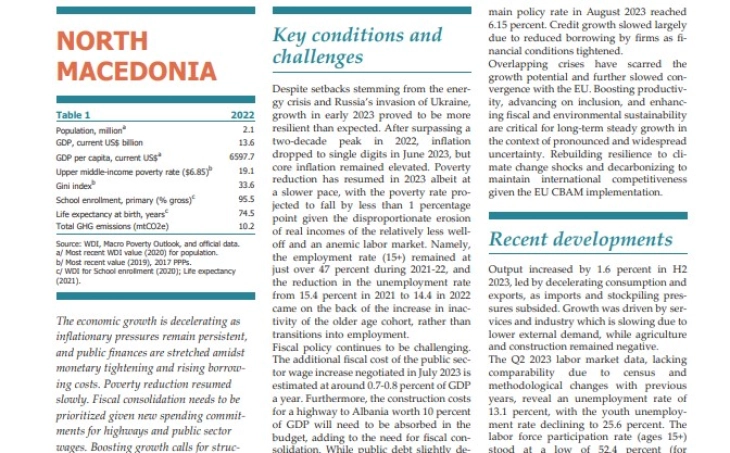Macedonian economy to rise by 1.8 percent, inflation at 9.1 percent: World Bank
- North Macedonia's economic growth will stand at 1.8 percent in 2023, 2.5 percent in 2024 and 2.9 percent in 2025. This year's inflation will reach 9.1 percent, dropping to 3 percent in 2024 and 2 percent in 2025, says the World Bank in its latest Europe and Central Asia Economic Update "Fall 2023: Sluggish Growth, Rising Risks".

Skopje, 5 October 2023 (MIA) - North Macedonia's economic growth will stand at 1.8 percent in 2023, 2.5 percent in 2024 and 2.9 percent in 2025. This year's inflation will reach 9.1 percent, dropping to 3 percent in 2024 and 2 percent in 2025, says the World Bank in its latest Europe and Central Asia Economic Update "Fall 2023: Sluggish Growth, Rising Risks".
The World Bank says the medium-term outlook is positive, but risks are tilted to the downside.
"Growth in 2023 is expected to increase modestly by 1.8 percent, reflecting a slowdown in external demand, and a persistent cost-of-living crisis, offset in part by the impact of the highway construction. Growth is expected to moderately accelerate in the medium term led by the rise in public investments, recovered consumption and exports, before slowing towards the potential growth trend thereafter. Annual inflation is projected to remain elevated at 9.1 percent in 2023 and fall to the long-term average of 2 percent in 2025", reads the report.

It adds that while underlying risks remain largely skewed to the downside and reflect the outlook for the country’s main trading partners, moving ahead with EU accession negotiations may accelerate critical reforms and unlock growth.
"However, heightened political uncertainty and a prolonged parliamentary impasse due to lack of consensus for constitutional changes and upcoming elections may delay reform implementation. Finally, policy slippages may risk fiscal sustainability and inflation persistence in turn requiring further monetary tightening that can further restrict financing options and decelerate economic activity going forward," says the World Bank.
Growth in the Western Balkans is likely to slow to 2.5 percent in 2023 from 3.2 percent in 2022.
In regional terms, Montenegro is projected to post the highest growth - 4.8 percent, followed by Albania (3.6%), Kosovo (3.2%), Croatia (2.7%), Bosnia and Herzegovina (2.2%), Serbia (2%) and Bulgaria (1.4%).
Photo: World Bank







